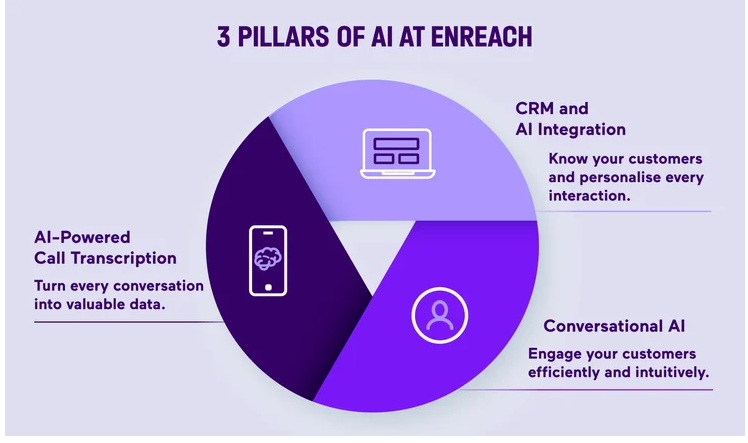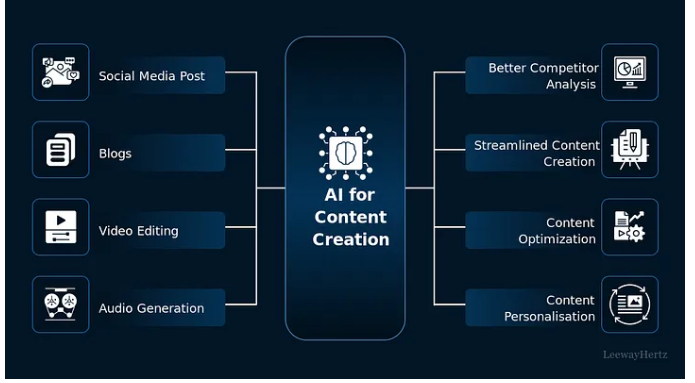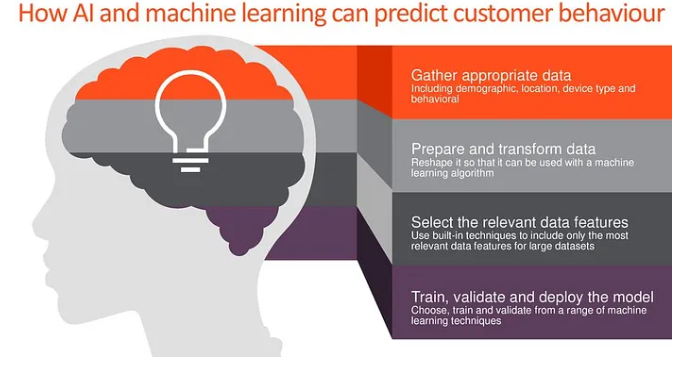Artificial Intelligence (AI) is revolutionizing how we approach digital marketing, offering a suite of tools that transform how we connect with customers.
The benefits of AI in marketing range from enhanced personalization to more precise analytics, allowing for smarter, more effective campaigns. As businesses strive to maximize their marketing impact, AI technologies are becoming indispensable.
Flying V Group is at the forefront of this revolution, harnessing AI to craft comprehensive marketing strategies that meet current needs and anticipate future trends, ensuring a real return on investment. Dive into how AI can elevate your marketing efforts and drive substantial growth.
1. Personalization at Scale
Data-Driven Insights: AI algorithms analyze vast amounts of data— from browsing habits to purchase history—to tailor marketing messages that resonate with individual preferences.
Dynamic Content Customization: AI dynamically adjusts the content users see, whether on websites, emails, or ads, to better match their interests, often in real-time.
The impact of such personalized marketing is profound:
Enhanced Customer Experience: Consumers feel understood and valued, creating a deeper brand connection.
Increased Engagement: Personalized content is more relevant and engaging, keeping users on your page longer and encouraging more interactions.
Higher Conversion Rates: Consumers are more likely to move from browsing to purchasing when messages resonate more personally.
2. Enhanced Data Analysis
Here’s how AI enhances data analysis in marketing:
Efficient Data Processing: AI systems can quickly sift through massive quantities of data, identifying patterns and trends that might go unnoticed by human analysts. This includes everything from user engagement metrics to complex purchase behaviors.
Predictive Analytics: AI uses historical data to forecast future trends. For instance, it can predict which new products are likely to succeed or how changes in consumer behavior might affect future sales.
Real-Time Insights: AI tools provide real-time analytics, allowing marketers to adjust their campaigns swiftly. This is especially useful in dynamic environments like social media, where user reactions and trends can shift rapidly.
Impact of AI-Driven Insights on Decision-Making:
Targeted Campaigns: With deep insights into customer preferences and behaviors, businesses can create more targeted marketing campaigns that are likely to yield higher returns.
Optimized Budget Allocation: AI helps marketers understand which channels and strategies are performing best, allowing for smarter allocation of budgets.
Enhanced Customer Journeys: By understanding customers’ paths, AI can help craft more effective customer journeys, improving overall user experience and satisfaction.
3. Automated Customer Interactions
Automated customer interactions powered by AI, such as chatbots, have revolutionized how businesses engage with customers. These tools are not just about providing answers but about enhancing the customer experience with efficiency and scalability.
Key Aspects of AI-Powered Customer Interactions:
- 24/7 Availability: AI chatbots are available around the clock, ensuring customer inquiries are addressed anytime, day or night, without delays.
- Instant Responses: Unlike human operators who may need time to retrieve information, AI chatbots can instantly access vast databases to provide accurate responses swiftly.

Benefits of Automated Customer Interactions:
Improved Customer Satisfaction: Customers appreciate quick, efficient service. AI chatbots enhance the user experience by providing immediate assistance and reducing wait times, directly boosting satisfaction and loyalty.
Cost-Effective Support: Automating routine inquiries with AI allows companies to handle higher volumes of customer interactions without proportional increases in staff. This can significantly reduce operational costs.
Scalability: As business scales, AI systems can easily handle increasing interactions without additional human resources.
Consistency in Service: AI ensures that every customer receives the same level of service quality, maintaining consistency across all interactions, which is crucial for brand reputation.
4. Optimized Advertising
How AI Optimizes Advertising:
Precision Targeting: AI analyzes consumer data such as browsing patterns, purchase history, and social interactions to identify the most likely buyers. This enables ultra-specific targeting, ensuring ads reach those with the highest potential to convert.
Budget Optimization: Machine learning algorithms continuously adjust bidding strategies and allocate budgets across campaigns to maximize performance. This dynamic adjustment helps avoid overspending on underperforming ads and channels.
Examples and Impact of AI in Advertising:
Performance Prediction: AI tools predict the potential success of different ad creatives before they are fully launched. For example, by analyzing past performance data, AI can forecast which images, headlines, or calls to action will perform best.
Real-Time Adjustments: AI doesn’t just set and forget; it makes real-time adjustments based on ongoing campaign data. If certain demographics or ad placements are not performing as expected, AI can instantly redirect funds to more effective options.
ROI Improvement: AI significantly improves ROI by ensuring ads are seen by those most likely to be interested and adjusting campaigns in real-time. For instance, an online retailer using AI could see a decrease in customer acquisition costs while increasing conversion rates.
5. Content Generation and Optimization
AI’s Role in Content Generation and Optimization:
Automated Content Creation: AI can generate basic content for articles, social media posts, and even more detailed reports, significantly reducing the time and resources traditionally required for content production.
SEO Enhancement: AI tools analyze keywords, search trends, and SEO guidelines to optimize content for better search engine rankings. This ensures that your content is reader-friendly and visible to a wider audience.

Benefits of AI-Driven Content Personalization:
Tailored Experiences: AI analyzes user data to understand preferences and behaviors, allowing for the creation of customized content that resonates with different segments of your audience. This increases engagement and conversion rates.
Consistency Across Platforms: AI ensures that the tone and style of content remain consistent across all platforms while optimizing it according to the specific preferences of each platform’s audience.
Dynamic Content Updates: AI can update content in real-time based on new data and emerging trends, keeping the information relevant and engaging for users.
6. Email Marketing Automation
How AI Automates Email Marketing:
Advanced Segmentation: AI algorithms analyze customer data, including past purchases, browsing behaviors, and engagement levels, to create highly detailed segments. This allows for incredibly targeted messaging.
Personalization at Scale: AI generates personalized email content for each recipient based on their specific preferences and behaviors, making each communication feel uniquely tailored.
Optimal Timing and Frequency: AI determines the best times to send emails to maximize open and conversion rates. It can also adjust the sending frequency based on customer engagement, preventing over-contacting and enhancing receptivity.
Impact on Campaign Effectiveness and Efficiency:
Increased Open Rates: Personalized subject lines and content, optimized by AI, significantly increase the likelihood of emails being opened.
Higher Conversion Rates: Tailored messages resonate more deeply with recipients, leading to higher engagement and conversion rates.
Efficient Resource Use: Automating the segmentation and personalization processes frees up marketing teams to focus on strategy and creative content rather than manual data analysis and campaign execution.
7. Predictive Customer Behavior Analysis
How AI Predicts Customer Behaviors:
- Data Analysis: AI analyzes vast datasets covering everything from purchase history and online browsing patterns to social media interactions.
- Pattern Recognition: It identifies patterns and trends in the data, such as frequently bought items or times when shopping activity peaks.

Benefits of Predictive Analysis for Marketing:
Proactive Marketing: With predictive insights, marketers can create strategies that address future customer needs, even before the customer expresses them explicitly.
Precision Targeting:
Custom Offers: AI helps tailor marketing messages and offers to individual preferences, increasing the relevance and effectiveness of campaigns.
Timely Engagement: Predict when customers are most likely to make a purchase and engage them at the optimal moment.
Impact on Marketing Efforts:
Predictive analysis enables marketers to be not just responsive but proactive. They can deploy resources more efficiently, ensuring that marketing efforts are not wasted on uninterested segments but focused on prospects most likely to convert.
This strategic approach enhances customer satisfaction and maximizes marketing ROI, making AI-driven predictive analysis an indispensable tool in the modern marketer’s toolkit.
How AI Empowers Your Marketing Strategy for Superior Results
The benefits of AI in marketing are transformative, reshaping how businesses understand and engage with their customers. From personalized content and predictive analytics to automated interactions and optimized advertising, AI enhances efficiency and deepens customer connections.
For businesses looking to stay competitive and significantly improve marketing outcomes, adopting AI technologies is no longer optional—it’s essential.
Flying V Group excels in integrating AI into comprehensive marketing strategies, ensuring that your investment in AI delivers true ROI and keeps you ahead in the digital race. Embrace AI with Flying V Group and transform your marketing into a powerhouse of precision and innovation.
FAQs
1. What is AI’s role in improving customer engagement?
AI enhances customer engagement by personalizing interactions and content, ensuring messages are tailored to individual preferences and behaviors, leading to higher satisfaction and loyalty.
2. How does AI contribute to better ROI in marketing?
AI optimizes ad spending and targeting, and predicts customer behaviors, ensuring marketing efforts are more efficient and effective, significantly improving the return on investment.
3. Can AI in marketing help in reaching new customers?
Yes, AI identifies new customer segments and optimizes campaigns to reach these groups effectively, expanding your audience and increasing market share.
4. How does AI enhance email marketing campaigns?
AI in email marketing automates segmentation, personalization, and timing, increasing relevance and effectiveness and leading to higher open and conversion rates.
5. What are the benefits of using AI for content generation?
AI speeds up content creation, ensures content is SEO-optimized, and tailors it to the interests of different audience segments, enhancing engagement and reach.






0 Comments